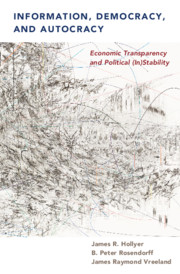1 - A New Approach to the Study of Transparency
Published online by Cambridge University Press: 17 September 2018
Summary
Transparency endures as a mantra for many policymakers concerned with improving life in the developing world. Asked how to improve governance in developing countries, the managing director of the International Monetary Fund, Christine Lagarde, has answered emphatically: “Transparency, transparency, transparency!” The international community has lauded efforts of some states, such as Bulgaria, Mexico, and South Korea, for increasing their historic levels of transparency, sometimes even heralding them as economic and political miracles. Other states, such as Argentina, Bangladesh, and Zimbabwe, have lost credibility due to their failure to report credible information about the state's economic activities.
Why are some countries more transparent than others? And what are the consequences – economic and political – of increased transparency? This book seeks to address these questions using an innovative measure of transparency. While we confirm some broadly held views, we also introduce new and surprising findings.
In essence, the book is about the role of the informational environment in political economy. Political action, such as voting or protest, requires coordination across individuals. Coordination, in turn, requires information – not just any information, but shared information. That is, mass political coordination requires information about actors’ higher-order beliefs: their beliefs about what other actors believe. The informational environment matters for mass coordinated political action.
The first puzzle we confront in our work is a measurement problem: how to gauge the transparency of economic information. nWe take advantage of something that usually stands as an obstacle to research: missing data. We observe that missing data are data. We use patterns of reporting data as a proxy for the publicness of credible economic information.
Using this measure, we find that more transparent countries attract higher levels of investment and that transparency stabilizes democracies. A rich informational environment facilitates economic decision-making and it enables voters to discriminate between good and bad leaders. When elections function better, democracies face fewer protests, enjoy greater legitimacy, and become more likely to survive. Not surprisingly, democracies tend to be more transparent than autocracies.
- Type
- Chapter
- Information
- Information, Democracy, and AutocracyEconomic Transparency and Political (In)Stability, pp. 1 - 28Publisher: Cambridge University PressPrint publication year: 2018



